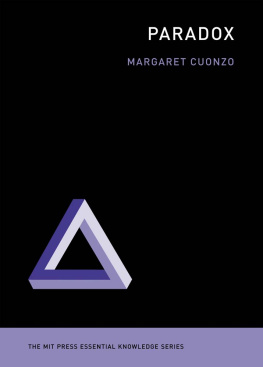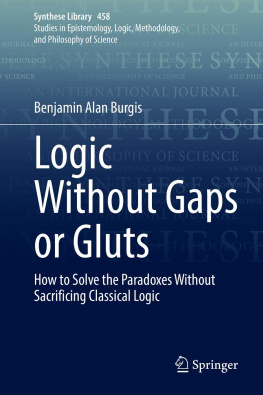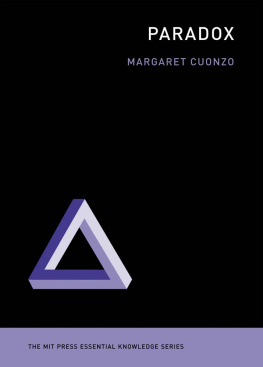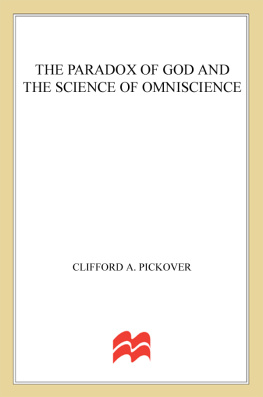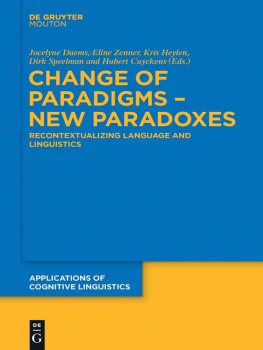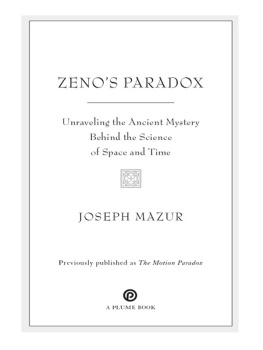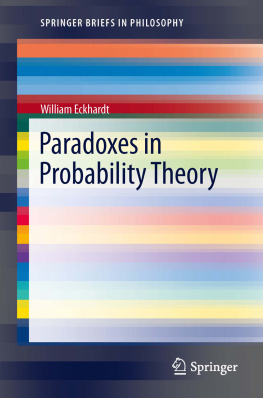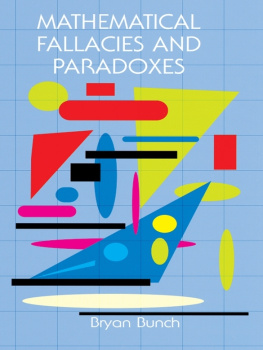Cuonzo - Paradox
Here you can read online Cuonzo - Paradox full text of the book (entire story) in english for free. Download pdf and epub, get meaning, cover and reviews about this ebook. year: 2014, publisher: The MIT Press, genre: Romance novel. Description of the work, (preface) as well as reviews are available. Best literature library LitArk.com created for fans of good reading and offers a wide selection of genres:
Romance novel
Science fiction
Adventure
Detective
Science
History
Home and family
Prose
Art
Politics
Computer
Non-fiction
Religion
Business
Children
Humor
Choose a favorite category and find really read worthwhile books. Enjoy immersion in the world of imagination, feel the emotions of the characters or learn something new for yourself, make an fascinating discovery.
- Book:Paradox
- Author:
- Publisher:The MIT Press
- Genre:
- Year:2014
- Rating:4 / 5
- Favourites:Add to favourites
- Your mark:
- 80
- 1
- 2
- 3
- 4
- 5
Paradox: summary, description and annotation
We offer to read an annotation, description, summary or preface (depends on what the author of the book "Paradox" wrote himself). If you haven't found the necessary information about the book — write in the comments, we will try to find it.
Paradox — read online for free the complete book (whole text) full work
Below is the text of the book, divided by pages. System saving the place of the last page read, allows you to conveniently read the book "Paradox" online for free, without having to search again every time where you left off. Put a bookmark, and you can go to the page where you finished reading at any time.
Font size:
Interval:
Bookmark:
Paradox
The MIT Press Essential Knowledge Series
Computing: A Concise History, Paul E. Ceruzzi
Crowdsourcing, Daren C. Brabham
Information and the Modern Corporation, James Cortada
Intellectual Property Strategy, John Palfrey
Memes in Digital Culture, Limor Shifman
Open Access, Peter Suber
Waves, Fredric Raichlen
Paradox, Margaret Cuonzo
Paradox
Margaret Cuonzo
The MIT Press | Cambridge, Massachusetts | London, England
2014 Massachusetts Institute of Technology
All rights reserved. No part of this book may be reproduced in any form by any electronic or mechanical means (including photocopying, recording, or information storage and retrieval) without permission in writing from the publisher.
Library of Congress Cataloging-in-Publication Data
Cuonzo, Margaret, 1969
Paradox / Margaret Cuonzo.
p. cm.(MIT Press essential knowledge)
Includes bibliographical references and index.
ISBN 978-0-262-52549-7 (pbk. : alk. paper)
ISBN 978-0-262-32140-2 (retail e-book)
1. Paradox. 2. Intuition. I. Title.
BC199.P2C86 2014
165dc23
2013017733
For my favorite paradox solvers, my nephews
Anthony and Andrew
Series Foreword
The MIT Press Essential Knowledge series offers accessible, concise, beautifully produced pocket-size books on topics of current interest. Written by leading thinkers, the books in this series deliver expert overviews of subjects that range from the cultural and the historical to the scientific and the technical.
In todays era of instant information gratification, we have ready access to opinions, rationalizations, and superficial descriptions. Much harder to come by is the foundational knowledge that informs a principled understanding of the world. Essential Knowledge books fill that need. Synthesizing specialized subject matter for nonspecialists and engaging critical topics through fundamentals, each of these compact volumes offers readers a point of access to complex ideas.
Bruce Tidor
Professor of Biological Engineering and Computer Science
Massachusetts Institute of Technology
Preface
When I began the long journey of writing this book almost fifteen years ago, I set out to write a treatise on famous paradoxes such as the liar paradox (which arises from the claim that what Im now claiming is false). The plan was to expand on the treatment given in my dissertation of the sorites paradox, which concerns the precise number of grains of sand necessary for something to be classified as a heap. I imagined dividing the book into the major categories of paradoxes: the semantic, epistemic, logical, and so on, solving each with my preferred treatment. Along the way, though, a number of roadblocks, detours, and accidental discoveries occurred. The first was finding out that I needed to rethink the nature of paradox itself and that, coincidentally, a new way of thinking about belief being discussed in philosophy of science circles (and using subjective probability) was a useful way to do so. I also discovered that the standard views of the origins of paradox were misleading. I had thought of paradoxes as emerging in great part through Zeno of Elea, and their solutions with Aristotle, but both of these views were misrepresentations of a much longer tradition. And, most important, I found that the well-worn path of focusing on the paradoxes themselves wouldnt lead to anything nearly as original and interesting as focusing on the strategies for solving them. So, I switched course and I invite you to join me as I rethink the nature of paradoxes and, more important, the solutions that have been given to them. I hope to show you that although the standard attempts to solve the great puzzles of philosophy and other fields are often false starts leading to dead ends and that adopting a very minimalistic approach to paradoxes is most often the safest route to take, this limited hands-off approach is by no means a road to nowhere. There is much to be learned from the paradoxes and the types of the solution they admit, regardless of whether we can consider any of the more powerful paradoxes capable of solution.
The first impetus for setting out on this journey was a couple of brief passages in my former adviser Stephen Schiffers works Two Issues of Vagueness (1999) and The Things We Mean (2003). Schiffer began to wonder about how successful any of the standard solutions to paradoxes were and created a division between what he called happy-face and unhappy-face solutions to paradoxes. Stephen Schiffer and his work have been key influences on this book and my philosophical thinking in general. Along the way, I was also privileged to attend a National Endowment for the Humanities summer seminar on error and statistical reasoning, organized by Deborah Mayo at Virginia Tech. This is where I first learned of Bayesianism and its use of subjective degrees of belief. And although Deborah convinced me of the limits of Bayesianism with respect to the confirmation and disconfirmation of scientific hypotheses, I found the Bayesian model quite useful in understanding paradoxes and why some paradoxes are more paradoxical than others. Other influences on this work include responses to papers that are incorporated into the chapters, especially those given at the Long Island Philosophical Society (LIPS), the organization I co-chaired with my friend James Friel. Anton Alterman and Glenn Statile provided useful critiques of the papers, and the book is much better for them. My colleague and friend Joseph Filonowicz, through his writing, teaching style, and general way of being, taught me to avoid worn out philosophical jargon and to experiment in my thinking and teaching. If this book gives pleasure to the general reader, it is due to Joes insistence that philosophical rigor and accessibility are not mutually exclusive. I would also like to thank my wonderful colleagues Kristana Arp, Chris Araujo, Michael Pelias, Amy Robinson, Maksim Vak, Sophia Wong, and the other members of the Philosophy Department at Long Island UniversityBrooklyn, which I chaired for six years and currently co-chair. Also, the members of my beloved journal group, including writers Gerry Albarelli, Helen Duberstein, Joan Durant, Eva Kollisch, Edith Konecky, and Eva White, encouraged me to pay as much attention to having a good, clear narrative as to having interesting arguments. Writer and oral historian Gerry Albarelli and I held retreats in his house in Cambridge, Massachusetts, and critiqued each others work. Having the input of someone who is a genius at hearing the story in even the most abstract of discussions and for questioning the facts that are laid down by an author was a great gift for which I am immensely grateful. Also, my dear friend, Dana Lerner, has tirelessly encouraged me for almost twenty years now. I am also very grateful to the supremely competent and supportive Philip Laughlin at the MIT Press, who saw potential in the work and championed it. Three anonymous reviewers provided much needed and appreciated feedback, as well. Finally, my family continues to provide much encouragement and support in all my endeavors. The loving memory of my mother, Rosemarie Cuonzo, and the continued nagging (er, I mean cheerleading) of my father, Antonio Cuonzo, kept me on track through some challenging times. And my nephews Anthony and Andrew, with their love of paradoxes and puzzles, are always a source of joy and motivation. I hope that you, reader, derive as much pleasure and enrichment on this journey through solutions and their paradoxes as I have.
Introduction: Is There Trouble in Paradox?
In a BBC television series aptly called Paradox, a British astrophysicist claims to have images of a future explosion in which many people are going to die. After seeing these images of the future, poor harried detective Rebecca Flint must try to prevent this vision from coming to be. But if Flint is successful, then wouldnt the images of the future thus be false? If all the destruction predicted in the images of the future never came to be, even if it were thanks to Flint, in what sense could these images be thought reliable? The puzzling nature of time has given rise to many philosophical paradoxes. In addition to problems like Flints, which are about altering the future based on our foreknowledge of it, there are also problems associated with the past, such as the grandfather paradox: the paradox associated with the question of whether it is conceptually possible to go back in time and kill your own grandfather before he met your grandmother. If it is indeed possible, then because you would not have existed in this scenario, it seems to be impossible. Because one of your parents would not have been born, you would not have been born, and hence you could not go back in time to kill your grandfather before he met your grandmother.
Next pageFont size:
Interval:
Bookmark:
Similar books «Paradox»
Look at similar books to Paradox. We have selected literature similar in name and meaning in the hope of providing readers with more options to find new, interesting, not yet read works.
Discussion, reviews of the book Paradox and just readers' own opinions. Leave your comments, write what you think about the work, its meaning or the main characters. Specify what exactly you liked and what you didn't like, and why you think so.

